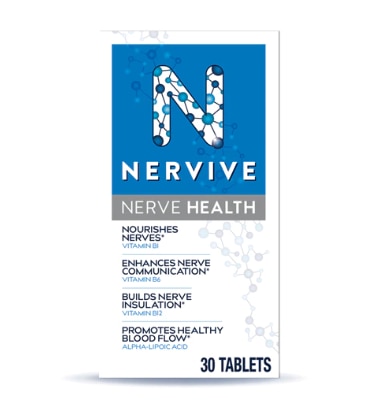A pinched nerve may sound somewhat inconsequential but anyone who has ever experienced the condition before knows they can be downright excruciating. From limiting your range of movement to seemingly paralyzing numbness, they can make the mere act of going about your day this-close to miserable.
The discomfort of a pinched nerve may seem uniquely yours (and that it is), but they’re also exceedingly common: As much as 40 percent of the population experiences sciatica nerve pain at some point in their lives. Another 85 out of every 100,000 US residents suffer from a pinched nerve every year, while roughly five percent of Americans wrestle with carpal tunnel syndrome at any given time.
And yet, no matter how prevalent pinched nerves may be, they’re not only widely misunderstood but it’s also largely unclear how they should be managed.
Until now. Let’s dive into the basics behind a pinched nerve and what you can do to both prevent and treat it.
What is a pinched nerve?
Put simply, a pinched nerve is a nerve that’s been overburdened with pressure from the tissues that surround it, such as your:
- Tendons
- Muscles
- Cartilage
- Bone
When this compression occurs, your nerve—which could be best described as a sheath of fibers (or axons) that send electrical pulses and messages throughout your body—is cut off from its capacity to function. This may result in a host of discomfiting (and even disabling) symptoms.
What are the symptoms of a pinched nerve?
Severely pinched nerves have no qualms about announcing themselves, but even a minor pinched nerve can provoke a variety of side effects, primarily in the form of:
- Burning, sharp, or aching pain
- Numbness or a lack of sensation
- The feeling that one of your limbs or appendages has “fallen asleep”
- Muscle weakness and fatigue
- Pins and needles (or what’s technically known as paresthesia)
- Decreased grip strength
- Difficulty with everyday movements, such as walking or sitting down
- Pain that changes when and how you move, such as turning your head to peer behind you or sleeping on your side
Less common but no less serious is bladder and bowel incontinence, which may be caused by a pinched nerve in your back, as well as neurological symptoms (more on this in a bit).
Where do pinched nerves occur?
Theoretically, a pinched nerve may occur nearly anywhere in your body by virtue of the fact that humans house somewhere near 7 trillion nerves.
That said, pinched nerves typically occur in places where nerves journey through tight spaces with very little soft tissue to cushion and protect them. The most common areas boil down to:
- Upper middle back (thoracic radiculopathy)
- Lower middle back (lumbar radiculopathy)
- Neck (cervical radiculopathy)
- Wrist (carpal tunnel syndrome)
- Sciatica, which is rooted in your lower back with a nerve that extends through your buttocks and down each leg
Oftentimes, a pinched nerve triggers pain that radiates across a whole section of the body. Meaning, it can be difficult to determine where the original injury occurred and may call for a more advanced exam—a topic we’ll turn to next.
How is a pinched nerve diagnosed?
Depending on the severity of your pinched nerve and the extent of your symptoms, your physician may perform a thorough physical exam and/or one or more of the following:
- Ultrasound, which leverages sound waves to gather a comprehensive, detailed picture of bones and soft tissues
- CT scan or MRI, which use high-tech imaging to find out what may be causing the pinched nerve (such as a bone spur)
- Electromyography, which assesses electrical signals in your muscles to establish whether you have nerve damage
Together with a physical exam that evaluates if and where you’re experiencing numbness, your healthcare practitioner may be able to locate where the pinched nerve may be, as well as its cause.
What causes a pinched nerve?
The causes of a pinched nerve are as diverse as those who suddenly—or gradually—experience one, such as:
- Repetitive movements: Happen to have a job that has you in front of a computer for the lion’s share of your workday? You may be at an increased risk for carpal tunnel syndrome, which is caused by compression of the median nerve in your wrist and can provoke everything from shooting pain, to a hand that feels altogether clumsy. Typing, though, isn’t the only repetitive movement that can constrict your nerves. Running, playing baseball, construction work, and even driving can place undue pressure on key nerves and precipitate nerve damage.
- Injuries and trauma: Injuries from car accidents (especially whiplash), sports, improper form when exercising, falling, and more may all prompt a pinched nerve.
- Spinal issues and degeneration: Your spine naturally changes over time, particularly if you sit or stand for several hours per day or haven’t prioritized good posture. Bone loss and structural alterations can also lead to spinal disc degeneration, or what’s more commonly known as a herniated disc. This may compress your spinal nerve and result in some of the more troubling symptoms of a pinched nerve.
- Pregnancy: Experts indicate that most expectant moms wrestle with at least one episode of sciatic nerve pain during their pregnancy, but a pregnancy-induced pinched nerve is also frequently seen in the groin, wrists and arms. Why does this happen? It’s namely due to fluid retention (a natural part of pregnancy), which intensifies the pressure on nerves.
It ought to go without saying that these aren’t the only culprits behind a pinched nerve. Certain conditions, such as diabetes, tumors, cysts, arthritis and osteoporosis, may render you more vulnerable to those bouts of numbness and discomfort. Poor posture, sleeping in an awkward position and the very act of aging (blessing that it can be) can all cause a pinched nerve too.
How can you treat a pinched nerve?
If you’re only experiencing mild symptoms and have endured spells of paresthesia and light, radiating pain in the past, you may be tempted to let a pinched nerve run its course. And while it’s true that many cases may resolve on their own, early detection and treatment is crucial to staving off permanent nerve damage. This may lead to “drop foot” (a condition in which a pinched nerve causes numbness in the foot and makes walking challenging, if not impossible), peripheral neuropathy and/or other health issues.
To that end, it’s vital to see your physician if your symptoms don’t subside after nurturing a pinched nerve with these remedies:
- Physical therapy: Working with a licensed physical therapist (PT) is largely deemed one of the most effective ways to work through the symptoms of a pinched nerve and dodge future injuries. How? Primarily by showing you precise movements that will stretch the muscles surrounding a pinched nerve and mitigating the pressure on it. A PT can also provide you with exercises (such as simple yoga poses) designed to build strength and flexibility to avoid further nerve damage.
- Acupuncture: The benefits of acupuncture for a pinched nerve are legion: Not only does the ancient practice boost circulation (which supplies damaged cells with the fresh blood and oxygen they need to rebuild nerve tissue) but it may also promote the production of endorphins—mood-brightening neurotransmitters that can uplift your pain threshold and make dealing with the symptoms of a pinched nerve all the more tolerable.
- R & R: It may not be a novel technique but sometimes all a pinched nerve needs is good, old-fashioned rest. Amplify a few hours of lounging and naps (or even a full day or more, if your symptoms are intense) by taking an over-the-counter pain reliever and applying heat if you have accompanying muscles spasms or applying ice to the inflamed area.
While these simple efforts may lead to huge results, sometimes nerve damage necessitates medical interventions, such as corticosteroid injections or surgery. You should also seek immediate medical attention if confusion, dizziness and a lack of balance accompany your symptoms: All of these neurological symptoms may be indicative of something more serious.
4 effortless ways to prevent pinched nerves
Some pinched nerves may be harmless and short-lived, but the sheer memory of the pain they can cause is motivation enough to seek out tactics to never be in that place again. Fortunately, there are a number of ways you can steel your nerves—literally—against injury, including:
1. Develop savvy stress-coping strategies
The link between high stress levels and a pinched nerve are increasingly in the limelight—and for a good cause: Chronic and acute stress can cause muscle tension, which in turn compresses your nerves. This is compounded by the fact that work stress may lead to poor posture (such as hunching over your laptop), sitting for prolonged periods and taking fewer breaks to decompress your spine (and mind!)
Stress may also heighten your risk of disc degeneration and spinal stenosis—a condition characterized by a narrowed spinal canal and increased nerve constriction. In other words, prioritize stress reduction particularly on rushed, chaotic days. A brief walk outside, a quick stretching session, 15 minutes of yoga—all can diminish nerve strain (and bolster your outlook and concentration).
2. Maintain a healthy weight
The importance of sustaining a healthy weight cannot be overstated. In addition to helping you ward off serious medical issues like coronary heart disease and type 2 diabetes, it offers a slew of mental health benefits and provides armor against nerve compression. How? Excess weight may place inordinate pressure on your nerves (especially in your lower extremities) and decrease the supply of blood they receive.
What’s more, excess weight may change the natural curve of your spine and push against your spinal discs; over time, this may cause them to become herniated or pinched. Maintaining an ideal weight can also give you a mega dose of confidence and inspire you to hold your head higher—and sound posture is key to keeping a pinched nerve at bay.
3. Supplement with care
A handful of vitamins, minerals and herbs organically promote nerve health, including:
- Coenzyme Q10
- Nerve Shield (which includes B vitamins, Huang Bai, folic acid and Baikal Skullcap—a powerful antioxidant that promotes a healthy inflammatory response)
- Thiamine
- Wood betony
- Blue vervain
- Chamomile
- Curcumin
4. Set a timer
Typing, reading with your neck bent, even sitting with your legs crossed for a long stretch may seem innocuous enough. Your nerves, which require adequate space to function appropriately, would suggest otherwise. To that end, set a timer with whatever you’re doing for extensive spells to take a break, change positions—or, better yet, squeeze in a few restorative exercises like cat/cow or standing forward fold.
On the flipside, leverage a timer when you set out for a bike ride, walk or freestyle dancing session: Physical exercise is a boon for nerve health, to say nothing of the splendid effects it can have on your strength, pliability and whole perspective on life.




